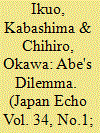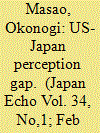| Srl | Item |
| 1 |
ID:
078022


|
|
|
|
|
| Publication |
2007.
|
| Summary/Abstract |
Abe Shinzô took over as prime minister of Japan on September 26, 2006. Thanks to the support of former Prime Minister Koizumi Jun'ichirô and his own popularity among the public at large, Abe assumed office with a strong base after winning the Liberal Democratic Party presidency with an impressive 66% of the total vote from LDP Diet members and local party chapters. In his previous positions as chief cabinet secretary and LDP secretary general, Abe supported the reforms initiated by the Koizumi administration.
According to a public opinion poll conducted by the Asahi Shimbun (published on September 28, 2006), the newly formed Abe cabinet enjoyed an approval rating of 63%-not quite as high as Koizumi's public support on taking office, but still the third-highest approval rating on record for a Japanese prime minister. However, a more recent Asahi poll (December 12, 2006) showed his public support dropping to 47%, owing mainly to disillusionment among young voters and those with no party affiliation (independent voters). The major reasons given were the vagueness of Abe's policy positions on issues and his decision to readmit into the LDP a group of dissenters who had opposed Koizumi's postal privatization plan.
|
|
|
|
|
|
|
|
|
|
|
|
|
|
|
|
| 2 |
ID:
078019


|
|
|
|
|
| Publication |
2007.
|
| Summary/Abstract |
The international community had high hopes for China's role in responding to North Korea's recent nuclear test, but events showed that Beijing actually does not have much leverage over Pyongyang. However much the Chinese may want to rein in the North Koreans, they cannot afford to break off the bilateral relationship, because they fear the nightmare scenario of a collapse of the North Korean regime, which would result in a massive influx of refugees
|
|
|
|
|
|
|
|
|
|
|
|
|
|
|
|
| 3 |
ID:
078017


|
|
|
|
|
| Publication |
2007.
|
| Summary/Abstract |
The North Korean test of a nuclear device last October produced a consensus in the UN Security Council on dealing with Pyongyang's nuclear ambitions. But unfortunately it is highly likely that North Korea will be in possession of nuclear weapons indefinitely. We must recognize that this may open a fairly deep fissure between Japan's interests and those of the United States and take care not to let North Korea exploit it.
|
|
|
|
|
|
|
|
|
|
|
|
|
|
|
|
| 4 |
ID:
078020


|
|
|
|
|
| Publication |
2007.
|
| Summary/Abstract |
From 1959 through 1984, some 93,340 Korean nationals and family members moved from Japan to North Korea under the latter's repatriation program. They had been fed a diet of propaganda depicting North Korea as a paradise, but the actual conditions they faced were harsh, and many were subsequently imprisoned on suspicions of insufficient loyalty to the regime. Some of the Korean men who repatriated were accompanied by their Japanese wives; these women, along with their offspring, suffered the most cruel treatment of all
|
|
|
|
|
|
|
|
|
|
|
|
|
|
|
|
| 5 |
ID:
078021


|
|
|
|
|
| Publication |
2007.
|
| Summary/Abstract |
Japan and South Korea are locked in a dispute over Takeshima, a set of islets in the Sea of Japan that the Koreans call Dokdo. The islets are small, but the issue of their ownership relates to the line between the two countries' exclusive economic zones, which remains unsettled. This poses a serious problem for Japanese fishers. To break through the current deadlock, Japan should renounce its claim to Takeshima in return for a Korean pledge to make it a nature preserve open to scientists of all countries
|
|
|
|
|
|
|
|
|
|
|
|
|
|
|
|
| 6 |
ID:
078018


|
|
|
|
|
| Publication |
2007.
|
| Summary/Abstract |
The US response to North Korea's nuclear test has focused on the concept of nonproliferation-blocking the transfer by Pyongyang of nuclear materials and technologies to other countries. But for Japan the main concern is the prospect of nuclear missiles in North Korea itself. It is too late to rue the failures of the Bush and Koizumi administrations; we must now prepare a joint Japan-US diplomatic strategy to bridge the bilateral perception gap.
|
|
|
|
|
|
|
|
|
|
|
|
|
|
|
|